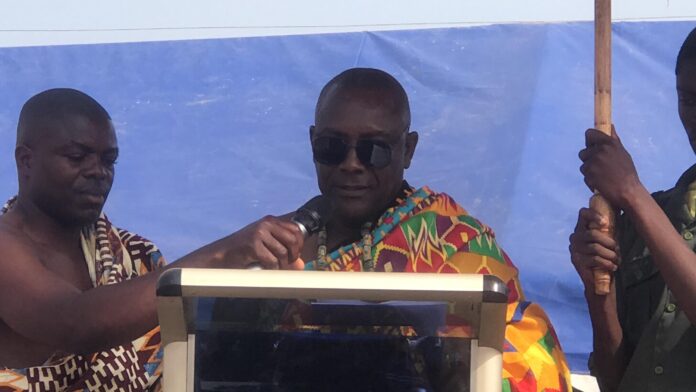The President of the Oti Regional House of Chiefs, Nana Soglo Alloh IV, has called for an amendment to Ghana’s Constitution to give a higher percentage of representation to traditional authorities in local governance structure.
He made the appeal on Friday, July 25, 2025, at the Dambai College of Education during a visit by President John Dramani Mahama as part of his nationwide thank-you tour.
Nana Soglo said chiefs in the Oti Region are urging the government to amend Article 242(d) of the 1992 Constitution to allocate a higher percentage of the portion of district assembly seats currently filled by government appointees to traditional authorities.
He suggested that 30 per cent of the assembly membership, which is currently appointed by the President in consultation with local groups, should be given to chiefs.
According to him, this change would make Ghana’s decentralisation process more reflective of the role traditional leaders already play in dispute settlement, development efforts, and maintaining peace within communities.
“The 1992 Constitution does not integrate chiefs into the local government system. The only formal link is through the Regional Coordinating Councils,” he said. “Since local government is nonpartisan, there should be no constitutional bar to traditional participation, he said".
Nana Soglo also called for traditional councils to be allocated a share of the District Assemblies Common Fund to support their roles in community development, conflict mediation, and customary justice.
“District assemblies should also allow open, independent, and voluntary attendance by chiefs to observe proceedings,” he said.
The call for reforms comes against the backdrop of rising tensions and conflict in some parts of the Oti Region. Nana Soglo referred to recent violence in Nkwanta South, chieftaincy disputes in Pahi, and Kadjebi, and growing unease in Kpassa.
He said the inclusion of chiefs in local governance could help address these issues more effectively through local dialogue and early intervention.
Established in 2020, the Oti Regional House of Chiefs is yet to have a permanent office and meeting place. According to Nana Soglo, construction of the House’s building has halted following a change in government. Currently, meetings are held at the Regional Coordinating Council, with the House sharing space with the Lands Commission in Dambai.
Despite these setbacks, he said traditional authorities in the region remain committed to supporting national development.
“The people have remained steadfast despite economic hardship. They believe they have kept their part of the bargain and now expect visible infrastructure and improved governance as their return,” he said.
President Mahama was in the region to thank residents for their support in the 2024 elections, which brought him and the National Democratic Congress (NDC) back into office.

